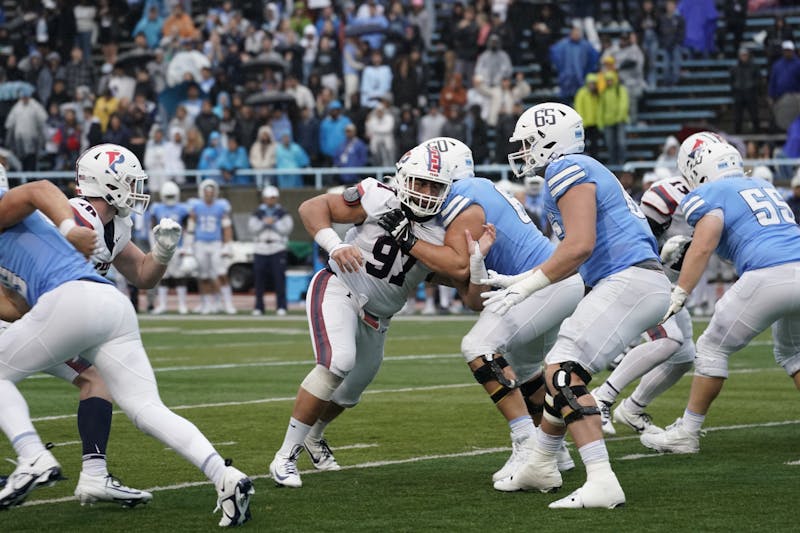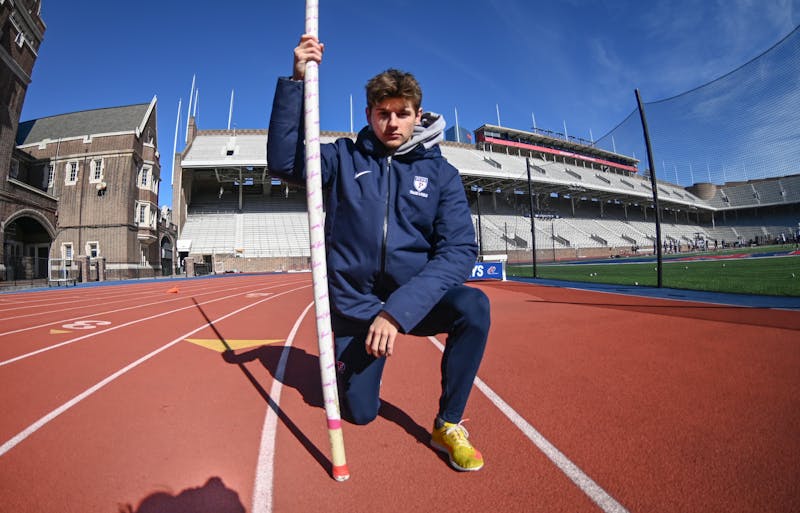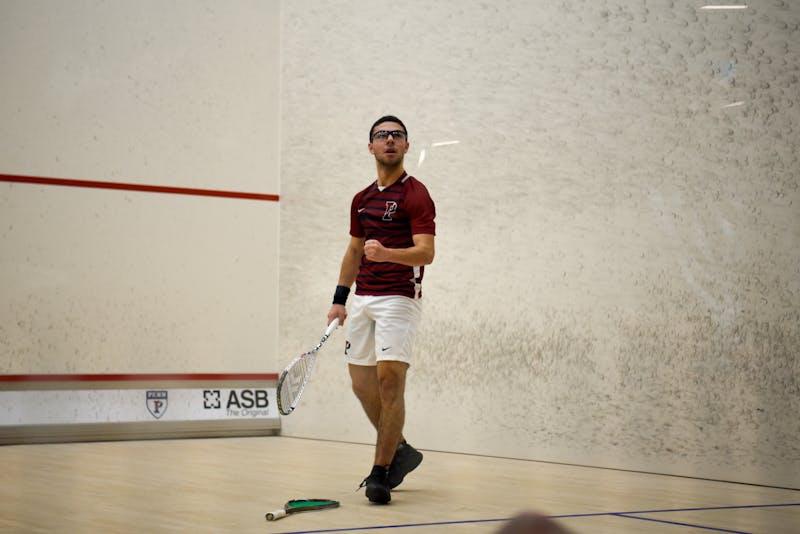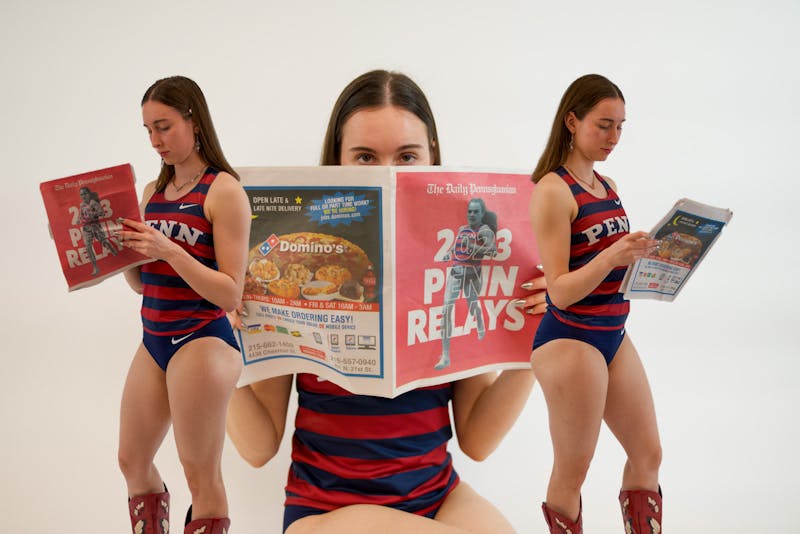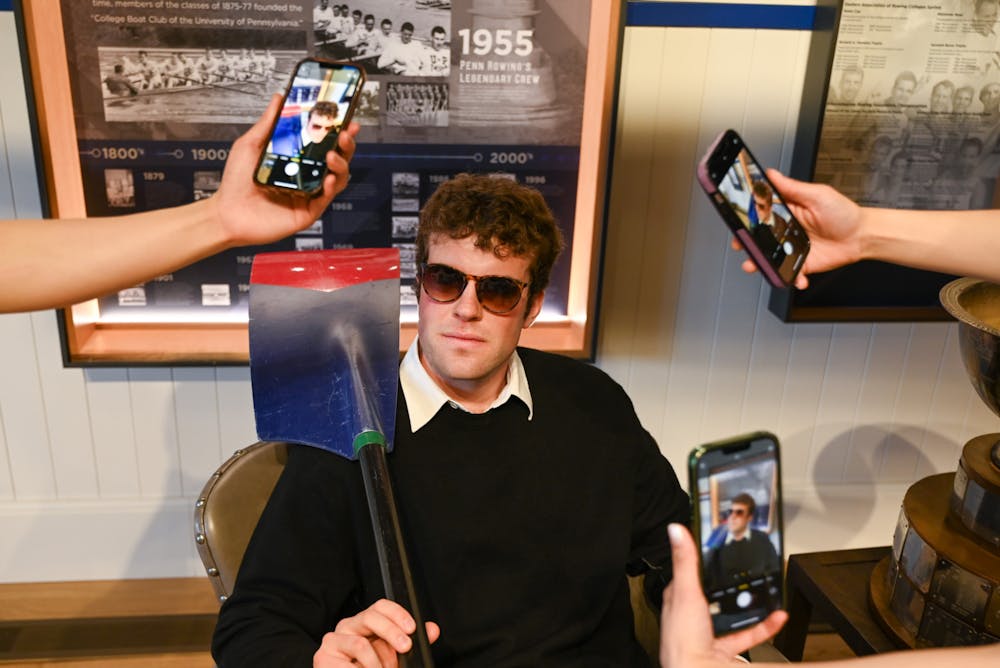
Senior heavyweight rower Ben Rutherford poses with his oar and three phones on Mar. 24.
Credit: Weining DingStanding at an intimidating 6-foot-2 and 210 pounds, most people’s first impression of senior heavyweight rower Ben Rutherford would not be that of an underdog. Rutherford’s genuine appreciation towards his team, coaches, and community are the marks of a leader who has made it through to the other side in the face of heavy adversity.
Rutherford’s rowing career started at Gonzaga College High School, a Catholic school in Washington, D.C. with a strong rowing program and a reputation for producing elite athletes. His grandfather rowed for La Salle University, and Rutherford soon followed in his footsteps by participating in learn-to-row camps, eventually joining the high school team. He thrived off the balance of endurance and teamwork that rowing offered and soon took off in the recruiting process. Despite visiting many other schools with strong rowing programs, Penn captured his heart.
“I came here on my official visit and hit the classic freshman spots," Rutherford fondly remembers. "Lyn’s food cart, a writing seminar, and even a massive ECON lecture. The true freshman experience.”
His time at Penn was not smooth by any means. His freshman year was plagued by COVID-19, essentially causing him to lose his first season. His sophomore year was spent rebuilding the team and getting back into shape to compete. When everything started getting back to normal right before his junior year, the former coach, Bryan Volpenhein, suddenly resigned a week before the school year, leaving the team without a coach.
“For the first two months of our junior year, we were without a coach. Our assistant coach really stepped up and kept the ball rolling,” Rutherford said. “I think I really attribute the maturity of the squad in that moment and our assistant coach for stepping up and helping keep the momentum.”
Eventually, current coach Al Monte was hired. During Monte’s transition into the position, Rutherford improved drastically. Rutherford had his eyes on a lofty goal: an invitation to the highly selective U23 national rowing camp, where the best rowers around the country would have the chance to vie for representing Team USA on the national stage.
“At the start of the year, it was pretty out of reach but I had a great run of success," Rutherford said. "My body was responding really well to the training plan.”
But as his training hit its peak during spring break, Rutherford heard a devastating pop in his ribcage. He had fractured his rib, which typically translated to an eight-week recovery period. With the injury unfortunately occurring right before the spring season, this came at a terrible time for Rutherford.
“That was devastating at the time because I felt that I was in the best position that I’d ever been in, I’d taken on a role as a leader on the team," Rutherford said. "And it was difficult for me to be sidelined.”
The turning point came when he had the chance to talk to his dad, who offered some sage advice to the discouraged Rutherford.
“You're in an incredibly difficult position right now. But you have a choice of how you can respond,” his father said.
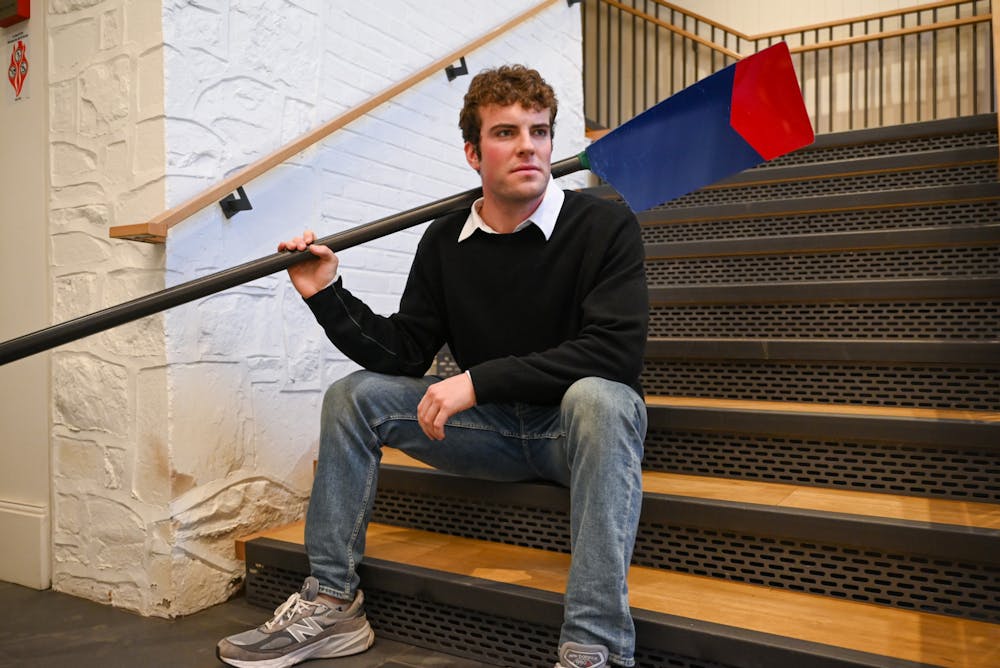
Senior heavyweight rower Ben Rutherford poses with his oar on Mar. 24.
After the talk, he was determined to not let this injury prevent him from relentlessly pursuing his goal. Every day, Rutherford would wheel out a stationary erg bike to the balcony of the Burk-Bergman boathouse and start biking from the moment his teammates launched off the dock to the moment that they returned, spending at least two to three hours a day pedaling. He embraced his recovery wholeheartedly and made sure that he could be a role model for his teammates despite being on the sideline. He even created a Spotify playlist titled “I broke my rib," subtitled “the whole boathouse gonna be listening to this whether they like it or not.”
After weeks of grueling recovery, Rutherford was able to finally row at the Intercollegiate Rowing Association Championships and Eastern Sprints, the final races of his junior year. The now-healthy rower, along with his teammates, was able to take the first varsity boat to its best finish in years at the IRAs, ultimately culminating in the win of the Chapman trophy — awarded for most improvement — for the Penn heavyweight team. But Rutherford’s aspirations did not stop there — he was still waiting for his invitation to the national rowing camp.
After the long wait, Rutherford finally got the call: the U23 camp hadn’t given him an invite.
“I got a call from the guy who runs the U23 camp and he said, ‘You know, sorry to hear about your injury. You know, if that hadn't happened, we might have had a spot for you but right now you're on the waitlist,'” Rutherford recalled.
Disappointed, Rutherford lost hope, but there was some silver lining. Rutherford learned that his coach had nominated him for the Intercollegiate Rowing Coaches Association's Comeback Athlete of the Year award. Two days later, he ended up winning the prestigious award. When asked about what he learned from that experience, Rutherford said, “First, people love a comeback story. Secondly, it … was a great learning experience to find that sometimes you're going to be put in situations and you have two choices of how to respond. And if you acknowledge your circumstances and try to find a silver lining, there's a lot of merit that can be found in that.”

Senior heavyweight rower Ben Rutherford poses with his oar and a whiteboard on Mar. 24.
At the end of his junior year, he was also voted to be a team captain — a role that he stepped into with confidence and poise during his senior year. “My main responsibility is to act as a mediator between the coach and the rowers," Rutherford said. "I met with the captain of the Naval Academy rowing team over the summer, and he gave me the best advice. 'If the captain's job is easy, you're doing it wrong.'"
His work as captain has been essential to maintaining a healthy team dynamic.
“If my job was to motivate people, it would be a lot harder," Rutherford said. "But that hasn't been a concern because the guys are incredibly self-motivated and determined, and our coaches are very motivated. The difficulty and the challenge arises from getting people on the same page.”
This work has not gone unnoticed. His teammate and best friend, Cole Riedinger, said “I think, Ben, not just Ben, but what a lot of leaders on our team have successfully done … is create this culture. [We] will speak with one another, we do things for each other, each boat is not a separate clique.”
Rutherford even won the Nicholas B. Paumgarten Black Box award given by Penn rowing alumni in February, awarded to a rower who has overcome great adversity and come out the other side during their time at Penn.
His coach has recognized how deep his work has gone with the team. “He's inclusive. He's thoughtful. He genuinely cares about his teammates, and is always trying to wake people up,” Monte said. “I think he embodies so much of what the ideals of this program [are] and I think in that regard … He'll be a very tough guy to replace.”
Rutherford's role as team captain does not stop at mediating between coaches and rowers. One of his proudest accomplishments is developing the playlist for erg workouts, an upbeat mix of electronic music that matches the intensity required for their practices. His commitment, even to the team playlist, has shown his dedication to his sport and his team.
A theme that emerged among descriptions of Rutherford by his coach and teammates is his ability to face adversity without blinking. Injuries, rejections, and sickness never seemed to slow this rower down.
“He's always there with a smile. He's always there to lend a hand. He embodies what it means to be a teammate. You know, he's just always there, always willing to help, and always trying to do a little bit more,” Monte said.
Teammates describe him as someone who has strong character and consistently leads by example. Riedinger even described a recent event that was a testament to Rutherford’s strength: “Ben was super sick. He was throwing up a day or two before the 2K and he wasn't feeling good at all. But he decided to still do it. He pulled a great score. Honestly, it was surprising to the coaches given … he even improved on his times from like the past, which was just like insane to see another testament to his character.”
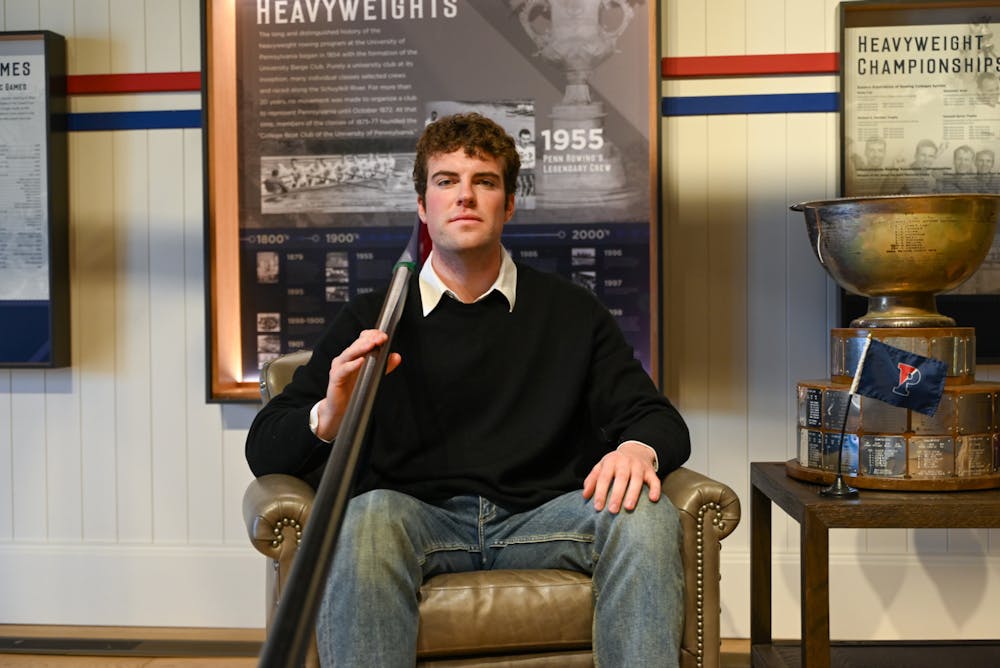
Senior heavyweight rower Ben Rutherford poses with his oar on Mar. 24.
Looking back on his career at Penn, Rutherford acknowledges he has learned a lot during his time here.
“One of the things that I realized, especially when I was injured, was the incredible support network I have. I feel incredibly grateful that over my four years, I've had the support of my family back home, but almost more you know, proximity-wise, it's in my teammates and my coaches,” Rutherford said. “It can be really difficult in a college setting to face adversity alone.”
Rutherford now hopes to leave his legacy on Penn rowing while also preparing for his future after graduation. After his final season with the heavyweight team, Rutherford will be traveling across the pond to get his master’s degree in urban planning at Cambridge University, while also rowing for its famed crew. The now heavily awarded rower also hopes to later return to his roots in the D.C.-Northern Virginia area to possibly work for an urban policy think tank.
“I also … [would like to] leave the season with no regrets,” Rutherford said. “I would love to be able to say as I take my last stroke as a Penn oarsman, that I gave it my all my senior year and didn't leave anything on the table.”
The Daily Pennsylvanian is an independent, student-run newspaper. Please consider making a donation to support the coverage that shapes the University. Your generosity ensures a future of strong journalism at Penn.
Donate







